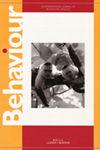An exploratory study of cooperation: food-sharing behaviour in wild varied white-fronted capuchin monkeys (Cebus versicolor) in Central Colombia
IF 1
4区 生物学
Q4 BEHAVIORAL SCIENCES
引用次数: 0
Abstract
Food-sharing is a cooperative behaviour related to the transfer of resources between conspecifics, and it is considered a complex prosocial behaviour because of its associated costs. It is more likely that an individual cooperates with closely related kin (e.g., in food sharing), and particularly with close maternal kin. In female philopatric species, such as Cebus spp., mother–offspring bonds likely explain patterns of maternal kin biases. On the other hand, the explanation of the evolution of food-sharing among non-kin is diverse. Capuchin monkeys (genera Cebus and Sapajus) are interesting to study cooperation since this is a critical behaviour to gain and protect ecological and reproductive resources in the wild, including care of their offspring. We performed an experimental protocol to induce behavioural observations with a provisioning technique using chicken eggs in a wild group of white-faced capuchin monkeys (Cebus versicolor). We aimed to test whether this white-faced capuchin monkeys engaged in food-sharing in the wild, describing the pattern of this cooperative behaviour. Furthermore, we also described some conditions that might affect this behaviour. We observed that these capuchins shared the eggs in passive exchanges, meaning that possessors let other individuals to eat from their egg. Our results further suggest that these exchanges may be due to mainly maternal kin biases. This study offers a preliminary observation of a little-studied capuchin species in the wild and adds information about how cooperation works in the wild.合作的探索性研究:哥伦比亚中部野生各种各样的白额卷尾猴的食物共享行为
食物共享是一种与同种之间资源转移有关的合作行为,由于其相关成本,它被认为是一种复杂的亲社会行为。个体更有可能与近亲合作(例如,在食物共享方面),尤其是与亲密的母系亲属合作。在雌性亲代物种中,如Cebus spp.,母子关系可能解释母系亲属偏见的模式。另一方面,对非亲属之间食物共享演变的解释是多种多样的。卷尾猴(Cebus属和Sapajus属)对研究合作很感兴趣,因为这是获得和保护野生生态和生殖资源的关键行为,包括照顾它们的后代。我们在一组野生白脸卷尾猴(Cebus versicolor)中使用鸡蛋进行了一项实验方案,以通过供应技术诱导行为观察。我们的目的是测试这种白脸卷尾猴是否在野外参与食物共享,描述这种合作行为的模式。此外,我们还描述了一些可能影响这种行为的条件。我们观察到,这些卷尾猴在被动交换中分享鸡蛋,这意味着拥有者让其他人吃他们的鸡蛋。我们的研究结果进一步表明,这些交流可能主要是由于母系亲属的偏见。这项研究提供了对野生卷尾猴物种的初步观察,并增加了关于野生合作如何运作的信息。
本文章由计算机程序翻译,如有差异,请以英文原文为准。
求助全文
约1分钟内获得全文
求助全文
来源期刊

Behaviour
生物-动物学
CiteScore
1.80
自引率
7.70%
发文量
44
审稿时长
3 months
期刊介绍:
Behaviour is interested in all aspects of animal (including human) behaviour, from ecology and physiology to learning, cognition, and neuroscience. Evolutionary approaches, which concern themselves with the advantages of behaviour or capacities for the organism and its reproduction, receive much attention both at a theoretical level and as it relates to specific behavior.
 求助内容:
求助内容: 应助结果提醒方式:
应助结果提醒方式:


